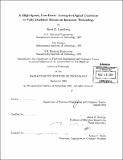A high-speed, low-power analog-to-digital converter in fully depleted silicon-on-insulator technology
Author(s)
Lundberg, Kent Howard
DownloadFull printable version (8.226Mb)
Other Contributors
Massachusetts Institute of Technology. Department of Electrical Engineering and Computer Science.
Advisor
James K. Roberge.
Terms of use
Metadata
Show full item recordAbstract
This thesis demonstrates a one-volt, high-speed, ultra-low-power, six-bit flash analog-to-digital converter fabricated in a fully depleted silicon-on-insulator CMOS technology. Silicon-on-insulator CMOS technology provides a number of benefits for low-power low-voltage analog design. The full dielectric isolation of the silicon island, where the transistors are built,allows higher layout packing density and reduces parasitic junction capacitances. Fully depleted silicon-on-insulator (SOI) exhibits improved subthreshold slope, which allows for lower transistor threshold voltages. Significant savings in power consumption can be obtained by leveraging these advantages. However, the floating-body effect can create significant problems in analog circuits, leading to potential circuit malfunction. A single-ended auto-zeroed comparator topology is optimized to leverage the advantages of fully depleted SOI technology and avoid the floating-body effect. Using this comparator topology and other circuit techniques that operate with a one-volt supply, a six-bit 500-MS/s flash A/D converter is designed with the lowest power-consumption figure of merit in its class. Consuming only 32 mA from a one-volt supply, the quantization energy figure of merit for this design is calculated to be EQ = 2 pJ. Test chips were fabricated in MIT Lincoln Laboratory's 0.25 [mu]m fully depleted SOI CMOS process. Testing of this design demonstrates the potential of SOI technology for the production of high-speed, low-power analog-to-digital converters.
Description
Thesis (Ph. D.)--Massachusetts Institute of Technology, Dept. of Electrical Engineering and Computer Science, 2002. Includes bibliographical references (p. 193-200).
Date issued
2002Department
Massachusetts Institute of Technology. Department of Electrical Engineering and Computer SciencePublisher
Massachusetts Institute of Technology
Keywords
Electrical Engineering and Computer Science.